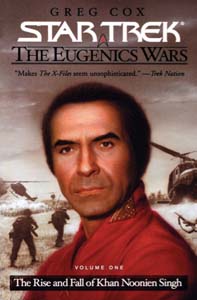 Given how JJ Abrams damaged Khan’s place in Star Trek mythos with his Nü-Trek version, I decided to poke around a local Half Price Books and scored this out-of-print find in the paperbacks. Sometimes the Kindle version just doesn’t cut it for portability.
Given how JJ Abrams damaged Khan’s place in Star Trek mythos with his Nü-Trek version, I decided to poke around a local Half Price Books and scored this out-of-print find in the paperbacks. Sometimes the Kindle version just doesn’t cut it for portability.
Anyway, I was curious to read about what kind of bad-ass Khan the dictator unofficially was in the non-canon Star Trek universe of novels; often the authors come up with much better plots and executions than their TV counterparts. Not the case here which was a pisser so I chose to bail on part two, freeing up the books for Somara and eventually my Trekkie friend Nelson.
I’ll kick off with the positive elements I do applaud Greg Cox for succeeding at. I loved how he utilized Kirk and the gang as the story’s “book ends.” The Federation has been contacted by a world that’s populated by genetically altered human colonists. Over a century ago, their ancestors secretly left Earth to create a world built around the ideals Khan’s scientist creators attempted in the 1990s. Now they’re asking to join the Federation in light of the genetic-manipulation ban. Since the Klingon Empire is interested in annexing them too, the colonists decided to reveal themselves and give the Federation first dibs. Kirk uses the downtime for the 72-hour journey to read up on the known history regarding the Eugenics Wars.
Kirk’s revised history lesson is what became rather disappointing. It’s all based upon the journals or reports from Gary Seven, the black cat Isis and Roberta Lincoln; the characters from “Assignment Earth.” As amusing as the episode was, it reeked of failed TV pilot being recycled into Star Trek to save money. Inserting Gary, Roberta and Isis ends up being a huge deus ex machina plot since they prevented Khan and his ilk from conquering the world…directly. In the 23rd Century, what we in America call the Clinton Years is when the Eugenics Wars took place. Despite all the relative peace we experienced (if you exclude the victims of the genocides in Rwanda and Yugoslavia alongside instability in a dozen other nations). Underneath a rather uneventful decade there was a small group of genetic super beings pulling the strings in their campaign for world domination only to be thwarted by an alien agency. WEAK!
At first it was initially cool. Cox weaved in elements from all the shows: Quark’s ship at Area 51 from DS9, the Borg and Mr. Flint. He intertwined the main characters’ activities around the real historical events: India’s nuclear weapons test, genetically manufactured glow-in-the-dark kittens, the Bhopal disaster, the old-guard Soviet establishment’s hatred of Gorbachev, the hole in the Ozone near Antarctica and the Challenger disaster. Eventually it becomes too confining because the author does everything to shoehorn the characters into history. The threat transforms into a nuisance since Gary tried to recruit Khan to be a fellow agent. LAME!
When Star Trek first aired in the Sixties, everybody figured a third World War was inevitable and going to happen in the near future. The writers goofed in how they used the word eugenics yet I think the memories of Hitler’s master race policies were still fresh in most people’s memories. Khan was the outcome of our wisdom being outpaced by how quickly we created technical marvels. I think Cox should’ve rolled the dice by either changing the timeline of Khan’s tyranny, say the mid the 21st Century, First Contact did this with WWIII, or stick to how the Sixties program outlined the Eighties and Nineties. Why not? The show established very on that time is flexible and was a proponent of the multiverse.
